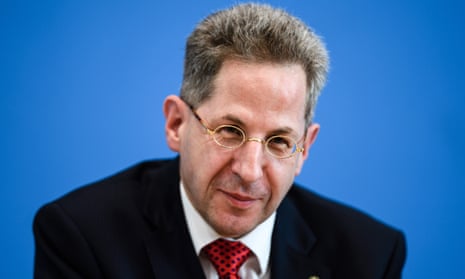When he was in charge of Germany’s domestic intelligence agency, Hans-Georg Maaßen warned of how easy it was for people to be led astray by “disinformation” and “clumsy fake reports” on the internet.
But since his dismissal from office last September, the former spy chief’s behaviour on social media has raised questions over his own ability to distinguish conspiracy theories from truthful reporting, and sparked a debate about the neutrality of the powerful intelligence agency during a period in which a resurgent far right marched over several days in the city of Chemnitz.
On Sunday Maaßen shared on Twitter an article from a rightwing extremist blog claiming that the rescue of a group of people adrift off the Libyan coast by the rescue boat Sea-Watch 3, and the subsequent arrest of its German captain, Carola Rackete, was in fact a “piece of propaganda” orchestrated by the German public broadcaster ARD.
The article likens a documentary about Sea-Watch 3 by ARD’s programme Panorama to the Nazi propaganda ministry embedding film crews on “Strength Through Joy” cruise ships, and suggests the film crew could have dragged the rescued refugees out to sea in the first place.
Maaßen, who started tweeting in April, commented on the shared article with the words: “Should this report be true, then Panorama is not western television” – a reference to an earlier tweet in which he implied that modern German media was as censorious as that of socialist East Germany.
The tweet has since been deleted, but questions over his judgment remain.
The blog, Journalistenwatch, is run by one of the co-founders of the now-dissolved Die Freiheit, a small rightwing party that was under observation by the Federal Office for the Protection of the Constitution (BfV), the intelligence agency that Maaßen used to lead. It currently advertises a demonstration in Halle organised by the Identitarian Movement, a group the BfV recently classified as a far-right threat.
“When you have a former head of the domestic intelligence agency referring to media whose business model consists of spreading obvious lies and rightwing extremist agitation, then that’s more than alarming,” said Claudia Roth, a Green party politician and Bundestag vice-president.
“It is terrifying to realise that, despite warnings, someone who finds meaning in a conspiracy theory outlet for the radical right was for years in charge of protecting the German constitution. The Green party has long been calling for a clear break and structural reorganisation of the domestic intelligence agency. Every day Hans-Georg Maaßen proves how urgent this is.”
In the wake of the murder of the Christian Democratic Union politician Walter Lübcke, allegedly at the hands of a neo-Nazi, politicians have questioned whether the domestic intelligence agency has neglected surveillance of rightwing extremist networks.
Maaßen was forced to step down last year after he provoked controversy by questioning the authenticity of video footage showing far-right protesters in Chemnitz chasing down migrants, and also appeared to downplay the violence. In 2016, he made headlines after insinuating that the US whistleblower Edward Snowden was a Russian spy – a claim not made by heads of other western intelligence agencies at the time.
While Maaßen no longer holds public office, he remains a member of Angela Merkel’s CDU, where he is a vocal supporter of the Werteunion, an inner-party group formed in protest against the chancellor’s asylum policy in 2017.
A spokesperson for the Werteunion confirmed the authenticity of Maaßen’s Twitter account, but denied the ex-spy chief had endorsed the content of the article.
“Mr Maaßen did not take a position on the content of the article,” the spokesperson said. “Rather, he explicitly made clear that the accuracy of the theses spread therein has not been established by using the phrase ‘Should this report be true’.”
